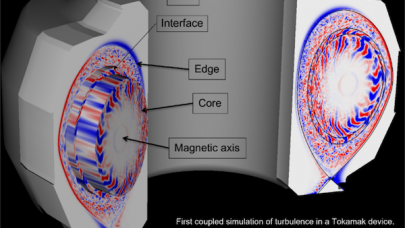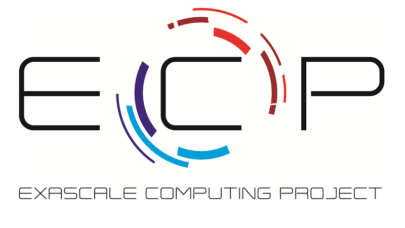
Lori Diachin to Lead the Exascale Computing Project as It Nears Final Milestones
May 31, 2023
The end goal is in sight for the multi-institutional Exascale Computing Project (ECP), which launched in 2016 with a mandate from the Department of Energy (DOE) Read more…

State of SYCL – ECP BOF Showcases Progress and Performance
February 28, 2023
Enabling interoperability across U.S. exascale supercomputers is one of the chief goals for the U.S. Exascale Computing Project (ECP), which has broadly oversee Read more…

Fusion Plasma Simulation Software Couples Tokamak Core to Edge Physics
July 15, 2022
The development of a whole device model (WDM) for a fusion reactor is critical for the science of magnetically confined fusion plasmas. In the next decade, the Read more…

HPCwire Talks Exascale with Doug Kothe at Oak Ridge National Laboratory
July 6, 2022
In this one-on-one interview, Doug Kothe – associate laboratory director, Computing and Computational Sciences at Oak Ridge National Laboratory, and director Read more…

Flux Supercomputing Workload Manager Hits Milestones in Advance of Supporting Exascale Science
March 2, 2022
High-performance computing, or supercomputing, combined with new data-science approaches such as machine learning and artificial intelligence (AI) give scientis Read more…

ECP Brings Optimizations to the MPICH Library
February 22, 2022
Message Passing Interface (MPI) has been the communications backbone for distributed high-performance computing (HPC) scientific applications since its introduc Read more…

ECP: Modernizing Workflow Analysis to Assist in Supercomputer Procurements
October 8, 2021
It is well known in the high-performance computing (HPC) community that many (perhaps most) HPC workloads exhibit dynamic performance envelopes that can stress Read more…

Verifying the Universe with Exascale Computers
July 30, 2021
The ExaSky project, one of the critical Earth and Space Science applications being solved by the US Department of Energy’s (DOE’s) Exascale Computing Project (ECP), is preparing to use the nation’s forthcoming exascale supercomputers. Exascale machines will enable the ExaSky team to verify the gravitational influences, gas dynamics, and astrophysical inputs that they use to model the universe... Read more…

- Click Here for More Headlines

Whitepaper
Transforming Industrial and Automotive Manufacturing
In this era, expansion in digital infrastructure capacity is inevitable. Parallel to this, climate change consciousness is also rising, making sustainability a mandatory part of the organization’s functioning. As computing workloads such as AI and HPC continue to surge, so does the energy consumption, posing environmental woes. IT departments within organizations have a crucial role in combating this challenge. They can significantly drive sustainable practices by influencing newer technologies and process adoption that aid in mitigating the effects of climate change.
While buying more sustainable IT solutions is an option, partnering with IT solutions providers, such and Lenovo and Intel, who are committed to sustainability and aiding customers in executing sustainability strategies is likely to be more impactful.
Learn how Lenovo and Intel, through their partnership, are strongly positioned to address this need with their innovations driving energy efficiency and environmental stewardship.
Download Now
Sponsored by Lenovo
Whitepaper
How Direct Liquid Cooling Improves Data Center Energy Efficiency
Data centers are experiencing increasing power consumption, space constraints and cooling demands due to the unprecedented computing power required by today’s chips and servers. HVAC cooling systems consume approximately 40% of a data center’s electricity. These systems traditionally use air conditioning, air handling and fans to cool the data center facility and IT equipment, ultimately resulting in high energy consumption and high carbon emissions. Data centers are moving to direct liquid cooled (DLC) systems to improve cooling efficiency thus lowering their PUE, operating expenses (OPEX) and carbon footprint.
This paper describes how CoolIT Systems (CoolIT) meets the need for improved energy efficiency in data centers and includes case studies that show how CoolIT’s DLC solutions improve energy efficiency, increase rack density, lower OPEX, and enable sustainability programs. CoolIT is the global market and innovation leader in scalable DLC solutions for the world’s most demanding computing environments. CoolIT’s end-to-end solutions meet the rising demand in cooling and the rising demand for energy efficiency.
Download Now
Sponsored by CoolIT
Advanced Scale Career Development & Workforce Enhancement Center
Featured Advanced Scale Jobs:
HPCwire Resource Library
HPCwire Product Showcase
© 2024 HPCwire. All Rights Reserved. A Tabor Communications Publication
HPCwire is a registered trademark of Tabor Communications, Inc. Use of this site is governed by our Terms of Use and Privacy Policy.
Reproduction in whole or in part in any form or medium without express written permission of Tabor Communications, Inc. is prohibited.
























